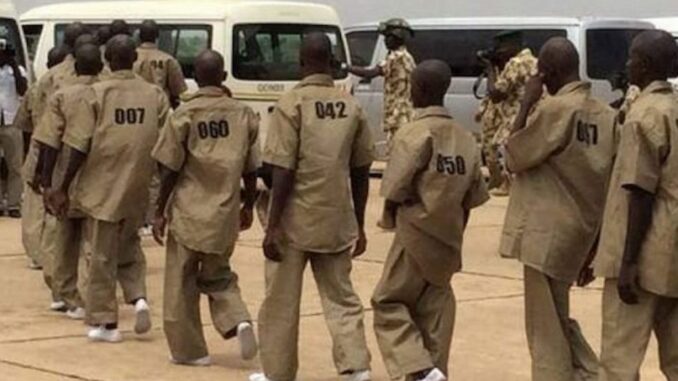
The arrest, the other day, of a “repentant Boko Haram fighter,” Ba’ana Bdiya, over a bomb attack on Nigerian soldiers that led to the deaths of at least three soldiers, is yet another strong indication that the federal government’s safe corridor programme, and its attendant rehabilitation of captured or surrendered terrorists, is wrong headed and unlikely to aid in ending the war against terror. That policy is against the grain of justice, and is unduly exposing Nigerian soldiers to untimely deaths; thus posing whether government is in support of soldiers or terrorists.
The policy takes no cognizance of hundreds of innocent citizens who are victims of terrorist attacks or have lost their relatives and loved ones to these insurgents. Besides, well meaning citizens wonder what the essence of extant laws on terrorism is, if the law cannot be invoked, as conceived, against terrorists and other violators. Government certainly needs a rethink on this policy, to save Nigerian soldiers, and to bring an end to the unceasing war against terror in Nigeria.
The repentant Boko Haram fighter, ‘Ba’ana, also known as ‘Manci,’ was among the thousands of Boko Haram members who were granted amnesty by the Federal Government for laying down his arms and accepting rehabilitation back into society. It was later revealed that despite renouncing his membership of the terror group, he maintained close contact with his former colleagues and has been supplying them with sensitive intelligence information on the movement of Nigerian soldiers, all with a view to ambushing and killing the soldiers.
So far, the intelligence information shared by Manci led to the ambush and killing of many Nigerian soldiers, including three soldiers on the outskirts of Banki town, Borno State where many other people were severely injured in February of this year, Manci also passed information to his Boko Haram fighter-colleagues that led to the successful ambushing and killing of Nigerian soldiers at Ngauri.
After almost eight years in power, the Muhammadu Buhari government has not only failed to defeat Boko Haram as it promised, it has also resorted to offering amnesty to “repentant” Boko Haram fighters in a hypocritical manner that is further endangering the society and compromising security.
Tragically, the so-called “repentant” Boko Haram fighters are not really repentant, but pretend to be, only to infiltrate the Nigerian army and compromise the fight against Boko Haram, thus killing soldiers almost every day. The Nigerian soldiers themselves are unhappy about the amnesty policy. According to one of them: “We continue to sweep across the bushes to flush these people out, and then the government will release them. Does that not amount to wasted efforts?” Another soldier said emphatically that “some of these so-called suspects are returning to the bush and they were never repentant.”
President Buhari and the incoming government should scrap the amnesty policy for the so-called Boko Haram fighters. The de-radicalization of Boko Haram fighters is hardly working in Nigeria for lack of facilities for their re-radicalization and rehabilitation. The policy has been unduly abused and politicized. Above all, it has not stemmed the tide of Boko Haram killings and atrocities in Nigeria. Therefore, the policy should be jettisoned. The country cannot be seen to be operating two criminal justice systems; one for the poor and another for Boko Haram fighters. There are many poor repentant detainees languishing in various Correctional Centres across Nigeria who have not been offered amnesty. If poor repentant detainees languishing in correctional centres in Nigeria for allegedly committing misdemeanors such as pilfering a loaf of bread are denied amnesty, why should the government offer amnesty to hardened Boko Haram criminals who have committed the heinous crime of murder and other capital offenses?
Recently, no fewer than 594 such “repentant” Boko Haram members graduated from the Federal Government’s Operation Safe Corridor’s De-radicalization, Rehabilitation, and Reintegration camp in Malam Sidi, Kwami Local Council of Gombe State.
To begin with, there is no guarantee that those “repentant” Boko Haram fighters have truly repented. But even if they had repented, it is morally wrong to rehabilitate criminals when justice has been denied to their victims. The essence of criminal law is punishment. The criminal justice system will lose its meaning when criminal suspects devise ways of trading off their trial, conviction, and punishment in the name of “repentance”.
Given the upsurge or escalation of Boko Haram atrocities in the North-East and other places in the last eight years, the government has no choice but to bring the Boko Haram terrorists to justice no matter whose ox is gored. Terrorism is succinctly defined as the calculated use of violence to create a general climate of fear in a population and thereby bring about a particular political objective.
The Global Terrorism Index (GTI) has ranked Nigeria as the third country with the most impactful and deadliest terrorist organization for the sixth consecutive time since 2015. The leader of the Indigenous People of Biafra (IPO) Leader, Nnamdi Kanu, was charged under sections 1 and 2 of the Terrorism (Prevention) Act 2011 (as amended) and sections 41, 44, 45, and 375 of the Criminal Code Act for alleged acts of terrorism. Last year, terrorism charges were brought against the Oyo traditional ruler, Oba Solomon Akintola, and 10 of his High Chiefs for allegedly invading Aagba Community in Oyo State, kidnapping three persons and injuring others.
Therefore, instead of offering amnesty to the so-called “repentant” Boko Haram fighters, the government should equally bring terrorism charges against them in the court of law in the interest of justice and to serve as a deterrent to other Boko Haram wrongdoers. The government cannot be seen to be aiding and abetting terrorism.
END

Be the first to comment